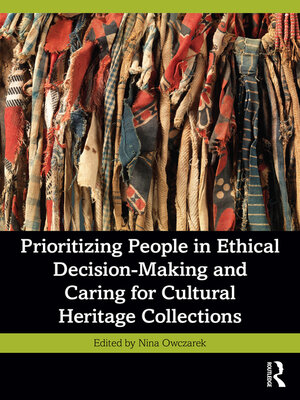Prioritizing People in Ethical Decision-Making and Caring for Cultural Heritage Collections
ebook
By Nina Owczarek

Sign up to save your library
With an OverDrive account, you can save your favorite libraries for at-a-glance information about availability. Find out more about OverDrive accounts.
Find this title in Libby, the library reading app by OverDrive.



Search for a digital library with this title
Title found at these libraries:
| Loading... |
While historically focusing on the object, the study of ethics in conservation has expanded to consider the human aspect of conservation work. This book offers a flexible framework to guide decision-making in line with this development, offering an inclusive, compassionate approach to collections care.
This edited volume contributes theories and international examples for advancing conservation practice and providing best practice for the field that centers people in conservation of cultural heritage and collections care. The first part examines the ethical theory that underpins conservation decision-making by challenging outdated norms, introducing updated methods, and demonstrating new ways to approach compassionate collections care. The second part considers the challenges of human-centered ethics in conservation practice, while the final part provides real-world examples and case studies of these best practices in action, including successful challenges to colonial authority. By presenting both theoretical and practical aspects of prioritizing people, this volume establishes the need for rethinking conservation approaches while demonstrating how to do so effectively.
Combining theory and practice, Prioritizing People in Ethical Decision-Making and Caring for Cultural Heritage Collections is valuable reading for conservation professionals, including collections managers, conservators, curators, and registrars. It will also benefit students working in Cultural Heritage Conservation, Museum studies, and Heritage Studies, as well as those taking courses in Art History and Anthropology.






